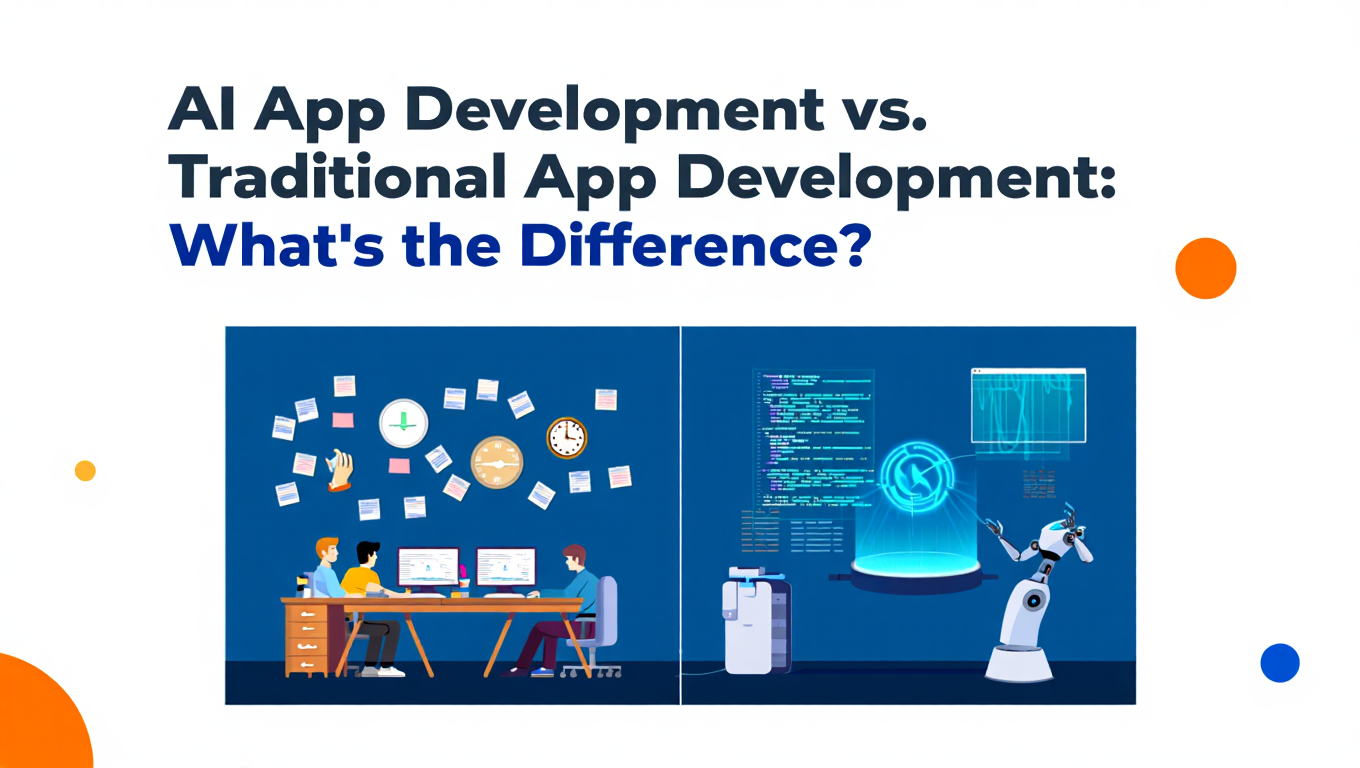The mobile app world has come a long way over the past decade. Apps used to be all about looking nice and running smoothly, but now AI is completely changing the game. In 2025, businesses and developers are using Artificial Intelligence (AI) to build apps that aren’t just functional—they learn from users, adapt to their needs, and deliver a truly personalized experience.
But what exactly differentiates AI app development from traditional app development? Understanding these differences is crucial for businesses, startups, and enterprises looking to stay competitive in today’s digital landscape.
What is Traditional App Development?
Traditional app development relies on predefined rules and static logic. Developers write code that instructs the app how to behave in different scenarios. Key characteristics include:
- Rule-Based Logic: Apps follow fixed if-then scenarios.
- Manual Updates: Every new feature or bug fix requires developer intervention.
- Limited Personalization: User experiences are mostly generic.
- Predictable Behavior: Apps perform consistently based on pre-written code.
Examples of traditional apps include standard calculators, static content delivery apps, or basic e-commerce apps without personalization features.
What is AI App Development?
AI app development integrates machine learning, natural language processing, and predictive analytics to make apps smarter. Unlike traditional apps, AI-powered apps learn, adapt, and evolve based on user behavior, environmental data, and interaction patterns.
Key features of AI app development include:
- Adaptive Learning: Apps can learn from user interactions to improve recommendations and predictions.
- Personalization: Each user receives a tailored experience, such as content, product suggestions, or notifications.
- Automation: AI can automate repetitive tasks, from data entry to chat support.
- Predictive Capabilities: AI anticipates user needs and provides proactive solutions.
Popular AI-powered apps include voice assistants, AI chatbots, fitness apps that adjust workouts based on user data, and recommendation engines in e-commerce.
Benefits of AI App Development
AI app development provides several advantages over traditional approaches:
Enhanced User Experience
AI enables apps to adapt to user behavior, providing personalized content, recommendations, and interactions that keep users engaged.
Automation and Efficiency
Tasks like customer support, data processing, and analytics can be automated, freeing human resources for higher-value activities.
Better Decision-Making
AI analyzes user data and provides insights, helping businesses make informed decisions about app features, marketing strategies, and product improvements.
Scalability
AI-powered apps can handle larger data sets, more users, and complex workflows with greater efficiency than traditional apps.
When to Choose Traditional vs. AI App Development
While AI app development offers impressive benefits, traditional app development still has its place:
- Traditional App Development is ideal for:
- Simple apps with predictable functionality
- Projects with tight budgets
- Applications that don’t require personalization or learning
- AI App Development is ideal for:
- Apps requiring dynamic personalization and intelligence
- Business apps that need predictive analytics and automation
- Enterprises seeking a competitive advantage with smarter digital products
How AI Development Companies Are Driving the Change
Leading AI development companies, including AI development company Dubai and global tech partners, are helping businesses implement AI in mobile apps. They provide expertise in:
- Machine learning integration
- Generative AI for content creation
- Predictive analytics and automation
- AI model optimization and deployment
By partnering with AI experts, businesses can future-proof their apps and deliver smarter, more engaging experiences.
Future Trends in AI App Development
The future of mobile apps will increasingly rely on AI-driven innovations:
- Generative AI features: Users will be able to generate content inside apps.
- AI-powered voice & chat assistants: More conversational, context-aware interactions.
- Predictive personalization: Apps that anticipate user needs and adapt proactively.
- AI-enhanced security: Real-time threat detection and adaptive authentication.
In 2025, businesses that adopt AI in their mobile apps will gain a competitive edge, increased engagement, and stronger customer loyalty.
Conclusion
It is clear how AI app creation differs from traditional app development: the former is intelligent, adaptive, and constantly learning, while the latter is static, rule-based, and predictable.
Businesses can gain a major edge in the digital-first era by selecting AI app development, which can enable automated workflows, predictive insights, and tailored experiences.


